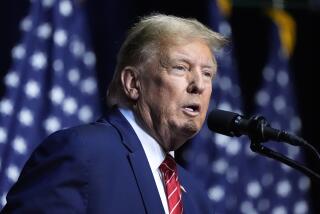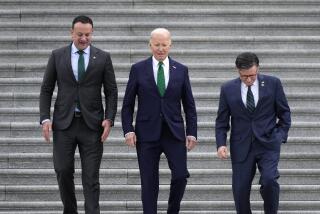Republican hopefuls lay groundwork for 2012
By one measure, the 2012 presidential campaign is off to a slow start.
No major candidate has officially jumped in, unlike four years ago, when nine White House hopefuls had declared their bids by the end of January 2007. Mindful that the first nominating contests in Iowa and New Hampshire might be pushed back a month, and wary of an anti-incumbent mood among voters that could make life difficult for a front-runner, potential Republican candidates are staying on the sidelines for now.
But by another measure — money — the campaign is in high gear.
President Obama’s potential challengers are busy cultivating donors, recruiting staff and testing campaign messages — conducting proxy campaigns that illuminate the approach they would take as White House hopefuls.
Some are building sizeable war chests through so-called leadership political action committees, which can collect as much as $5,000 per contributor for use in political activities not directly related to an official presidential candidacy. Others are using private groups to raise money and promote causes that may figure in their future campaigns.
Because the top likely contenders are not federal officeholders, they can raise money through state PACs, including those that have few or no limits on corporate and individual contributions.
By waiting to register with the Federal Election Commission as presidential candidates, they can raise money in large-dollar amounts and also keep lucrative television gigs that they would have to relinquish as candidates.
“The way the system is set up, it permits people to go around and spend some time effectively testing the waters,” said E. Mark Braden, an election law attorney who served as general counsel to the Republican National Committee. “On the whole, so long as prospective candidates avoid saying, ‘I’m running,’ or some synonym of that, the [Federal Election Commission] has pretty much avoided getting involved in that gray area.”
Obama is expected to raise a record $1 billion for his reelection, a figure that has inspired action and creative early approaches on the part of his GOP rivals.
Mitt Romney has put together an establishment, blue-chip operation, locking in top donors and banking more than $9 million through a network of political action committees. Sarah Palin is driving white-hot media attention and fervent grass-roots support through her Facebook posts and Fox News appearances.
Other candidates have found their own routes. Mississippi Gov. Haley Barbour, for instance, is drawing on the Rolodex of Republican contacts he developed as a longtime party fundraiser.
The likely candidates are expected to stick to this strategy for several more months as the election slowly ramps up. Former Minnesota Gov. Tim Pawlenty has said he will decide around March, but others may wait until early summer, which could still give them enough time to raise money and hire staff before the key Iowa straw poll in August.
Also among those mulling bids are former Arkansas Gov. Mike Huckabee and South Dakota Sen. John Thune, who has $7 million in his Senate campaign committee that he could roll into a presidential bid.
Mitt Romney
But among the prospective candidates, Romney clearly has the current advantage. The former Massachusetts governor and billionaire founder of Bain Capital has made the most energetic use of state PACs, a tactic that has helped him raise more than $9.2 million in the last two years in large- and small-dollar contributions. He’s used those funds to woo supporters in key states and pay staff who make up the backbone of his campaign team.
In 2010, Romney distributed $1.1 million to state and local candidates across the country, according to Eric Fehrnstrom, who served as Romney’s traveling press secretary during the 2008 campaign and now acts as the spokesman for his Free and Strong America PAC.
In addition to Fehrnstrom, Romney has been paying for the services of pollster Neil Newhouse and former campaign manager Beth Meyers. Star GOP money men Wayne Berman and Lew Eisenberg, who co-chaired John McCain’s presidential finance team in 2008, are wooing donors for Romney.
But unlike four years ago, when Romney held a one-day fundraising telethon in January, the former governor is in no rush to start formally campaigning. He is not expected to declare his candidacy until at least late spring.
“Mitt Romney learned a few things from his last campaign, and one of the lessons was that it got started too early,” Fehrnstrom said. “He’s not in any hurry to make an announcement.”
Sarah Palin
If Romney is taking the most traditional route, Sarah Palin’s approach has been the most unorthodox.
Since stepping down as Alaska’s governor, she has kept herself in the national spotlight through pungent social media posts and appearances on Fox News, where she is a contributor.
The media coverage that follows her every move often only serves to emphasize Palin’s polarizing effect. But what sets off her critics only cements the loyalty of her grass-roots supporters. Her leadership committee, SarahPAC, raised more than $5.5 million in the last two years, an amount second only to Romney’s, and 75% of the contributions came in increments smaller than $200.
While SarahPAC advisors have made some initial outreach to supporters in Iowa, Palin herself has not been openly courting the party’s most established activists and donors. But she has used her PAC to finance a team of political operatives, spending nearly $1 million on political, media and fundraising consultants, according to data from the Center for Responsive Politics.
Tim Pawlenty
Taking a page from the Palin model, Pawlenty is seeking to raise his profile this month with a media-saturated tour to promote his new book, “Courage to Stand.” His charm offensive has included stops on “The Daily Show” and “The View,” where he joked about tapping Whoopi Goldberg as his running mate.
Behind the scenes, Pawlenty is trying to cut into Romney’s institutional support through a relentless campaign of one-on-one meetings with key activists. Since January 2009, he has made 79 political trips to 39 states to back state and local candidates, his staff says.
His PAC contributed nearly $400,000 to 208 candidates around the country. In the pivotal nominating states of Iowa and New Hampshire, he has set up local PACs that have doled out money to candidates for agriculture commissioner, sheriff and state representative. Along the way he has picked up notable state-level supporters.
Haley Barbour
Pawlenty faces formidable competition in the fundraising realm if Mississippi Gov. Haley Barbour decides to run. Barbour has raised almost $2 million through federal and state PACs, but draws his real strength from his years of favor-trading with other Republicans — particularly this last year, when he raised and spent record sums as chairman of the Republican Governors Assn.
Unlike his Democratic counterpart, Barbour chose to spend money not just to benefit governors, but down-ballot races as well, amassing IOUs that could come in handy.
He is credited with helping Republicans score victories in governors races and in 21 state legislative chambers in November. That includes key nominating states such as Michigan, where the governors group dropped more than $7 million, much of it spent even after the GOP had the gubernatorial race sewn up.
Newt Gingrich
Newt Gingrich has also been canny about leveraging his projects to promote his interests and a possible presidential bid. Along with political action committees and new book tour, the former House speaker has built up a network of half a dozen nonprofit and for-profit organizations. One of them, American Solutions, raised more than $24 million in the last election cycle to mobilize supporters around issues such as job creation and repealing healthcare reform.
Another Gingrich nonprofit, Renewing American Leadership, has been calling attention to issues that concern religious conservatives, including the construction of an Islamic center near the World Trade Center site. His for-profit company, Gingrich Communications, recently launched Americano, a bilingual website aimed at Latinos.
He has also used his profile to raise substantial sums of money for his own political action committee and those of other conservative Republicans. His staff says he helped bring in $21.5 million for fellow Republican candidates and committees during 2010. Much of the money went to candidates and organizations in Iowa and New Hampshire.
Last week, Gingrich kicked off a tour to promote the paperback edition of his latest book, “To Save America: Stopping Obama’s Secular-Socialist Machine.” His first scheduled trip: the key primary state of South Carolina.
More to Read
Start your day right
Sign up for Essential California for news, features and recommendations from the L.A. Times and beyond in your inbox six days a week.
You may occasionally receive promotional content from the Los Angeles Times.






